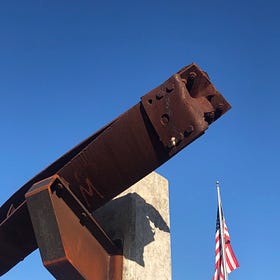Remembering is good for us
Reflections on September 11th.
For the past eight months, I’ve been working really hard to retrain my brain using neuroplasticity techniques to cure a condition diagnosed as mast-cell activation syndrome. That was a long lead-in to underscore how much I’ve been thinking about healthy ways to handle the long legacy of trauma. For many of us, fear, anger, sadness, and pain get repressed and pushed down, only to manifest in the body later as symptoms and ill health.
While we experience most trauma as individuals, some of these events are experienced collectively, like 9/11.
It’s now been a whopping 23 years since those terrorist attacks on US soil, though I realize some of you readers might not have been born by then and have no first-hand memory of the event. How dare you, with your scandalous youth! I’ll forgive you for that, but only because I hadn’t been born yet by the time JFK was assassinated, which for my parents’ generation was arguably their most memorable moment. But you might ask: Regardless whether you were around for 9/11 or not, isn’t it better just to forget it ever happened?

What I’ve come to in my own life is that the answer to that question is no. It’s far healthier to feel the powerful emotions triggered by a traumatic memory, especially if you were there, if you lived through it personally, but even if it’s a cultural one rather than lived experience. Feel them first, and then let them go.
But letting go doesn’t mean forgetting. The truth will always set us free, and remembering allows us to keep the truth alive, rather than papering over it, rewriting history, or pretending it never happened. Anything less is cultural gaslighting.
Letting go means not getting carried away by our emotions, not letting the fear, the anger, and the pain dictate our actions. I believe it’s important to remember tragic events, so that we can keep the truth of them alive and to work to never let the tragedy happen again—if there are ways to prevent it. Almost always, there are.
Memorials exist for this reason, to give us a place to grieve and safely remember: Without getting swallowed by the grief, without getting carried away with the anger, without allowing the pain to stop us in our tracks.
I had the opportunity to visit New York just a couple of years after 9/11. Here’s how I described it in a newsletter post.
I took a trip to New York in 2003 for a conference, and while I was there, I visited the World Trade Center site. At that time, it was a gaping maw in the ground, a hollow grave most notable for its bleak absence. What undid me was a child’s drawing in crayon, affixed to the chain-link fence surrounding the site: A set of massive inflatable slides, the kind you find on birthday party bounce houses, sweeping down from the upper windows of the buildings, allowing people to slide down to safety. Because ‘the falling man’ has been such a tragic emblem of that fateful day, the sweet desire of a child to save him moved me to tears.
Grief can give us this sweetness. Pain can be instructive, for the message buried within it. And anger is our wisdom, telling us what to stand up to next time, where to channel our best fighting energy, and where to draw boundaries. But that’s a complicated process of separating justified, righteous anger from wild vengeance—as well as self-destructive violence.
Here’s that 9/11 piece if you’d like to read it in full. I wrote it on the twentieth anniversary in 2021, when we were deep in the hypocrisy and overreach that unfortunately characterized too much of our response to the COVID pandemic. I think, sadly, it still holds up, but I’m glad now to have the perspective to add my new thoughts in this post and to share both with you today.
Questions for discussion, if it helps you to use the comments section to connect and share with others.
What are your thoughts on mental health and remembering?
Has it helped you to have a memorial, or a grave, or some other physical, tangible marker as a touchstone?
How do you feel about the idea of letting go—but never forgetting?




9/11 is the GenX equivalent to JFK’s assassination. We remember where we were when we heard the news. We glued ourselves to the television for updates. We wept. As a country, we came together, fixed on a common enemy, one that hated us enough to murder thousands of people who had never given them a second thought.
Here we are, 23 years later, more divided than before, hating each other with the same venom and fear once directed to those who attacked us. We are more willing to believe lies that tickle our ears than work through difficult truths. We pretend ideologies are more important than health. We throw our children to the wolves of social media while we pretend being busy makes us better.
We’ve forgotten how to lament and grieve, and it’s killing us.
Lisa, and others well said! I’ve never been to NYC , but remember where I was when JFK was assassinated, 3d Grade Mrs Garrity’s classroom, downtown Milwaukee, WI, and 9/11 watching WTC being struck by hijacked airliners on TV in my home in Hubbard Tx, and working 2d shift in stunned deafening silence. Never will forget those moments in time till I draw my last breath. Thank you all for sharing from your hearts. George W.